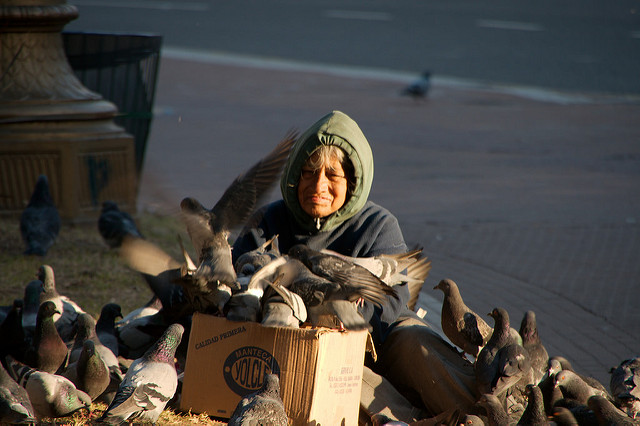Here’s what I know from working at a women’s homeless shelter:
When I graduated college, I got what I thought was my dream job as a tech writer at a security firm.
Three days later, I walked out of that office building and never went back. I then questioned what I was actually going to do—would I still try to write? Could I make any money doing that? The only thing I knew for sure was that I wanted to help people.
After reading an ad for a position at a women’s homeless shelter, I was intrigued. Their mission was all about empowering women. I immediately felt connected and wanted to learn more. After two interviews and meeting some of the women, I was hired.
Nothing I learned in college prepared me for working with these amazing women. I’ve been here for nearly three years now, working at a residential building for homeless women that come through our shelter. I love my job. It has been an experience that’s been grounding and uplifting all at the same time.
Here’s what I know from being a part of this community.
We truly have no idea what someone else has been through.
It’s easy to look at someone else’s life and judge their decisions. From drug use to prostitution to domestic violence, it’s easy to think that someone made the choices that got them in their current situation.
This is completely true—people do make the decisions that define their situation. However, there are so many other decisions they don’t make.
The decision to be abused as a child.
The choice to be born a gender they don’t identify with.
The decision to witness trauma and violence.
The choice to lose a child.
The decision to have a mental illness.
From the outside, sometimes all people see is the end result of the decisions these women have made. From the inside, I see the pain, trauma, abuse, and eventually, the grace that has led them to where they are today, step by step.
These women are here because they’re trying to do something different with their lives. They want to be better. They crave the opportunity to heal. I feel fortunate to be a part of their journey, from the highs of someone graduating from a nursing program to the lows of someone overdosing in their room.
We are all a step away from being homeless.
Homelessness isn’t something I’ve experienced. Not in my own life, anyway.
Sometimes the descent to homelessness happens over a period of years. Other times, it’s just an instant and then you have nowhere to go.
Our housing situations are never as stable as we think they are. All it takes is someone losing a job, getting an injury, or being diagnosed with a mental illness. When we’re not able to work and pay the rent, the ground that was so seemingly unwavering starts to get unsteady.
We may think relatives would take us in when we have nowhere to go. We think friends would step up and let us sleep on their couches. While this is true for some people, it’s not true for others. Some women find themselves in desperate situations. Some women suddenly find themselves homeless.
The truth is that we are all one step away from being homeless. What would need to happen in our lives in order for us to lose our housing? When we think about it, the reality is that it wouldn’t take that much.
Both women and men suffer on the streets.
Although many of us would argue that women are more vulnerable, the reality is that both men and women suffer when it comes to homelessness.
In fact, the terrible conditions in men’s homeless shelters often surpass that of women’s when it comes to safety, cleanliness, and even funding. Women’s homeless shelters are more likely to have greater donations, better resources, and more qualified staff.
Our organization accepts any individual who identifies as a female. We work with many transgender women, but as the majority of homeless people are men, we also see the husbands, brothers, boyfriends, and sons of the women we work with who are struggling with homelessness. Often, these men stay during visiting hours as long as they can to avoid going back to their own shelters.
Mental illness is widespread.
I was amazed when I started my job at how many of the women were struggling with mental illness. Statistics show that up to 25 percent of the homeless population suffers from some type of mental illness. In my experience, the number is a lot higher.
These women experience depression, anxiety, schizophrenia, and many other disorders. When the women first come to the shelter, these illnesses are often untreated. Some who don’t struggle with their mental health face an addiction to alcohol or drugs.
The disorders these women face would be challenging for people not experiencing homelessness. When you have a mental health problem and an addiction, homelessness is that much more debilitating.
We are all connected through humanity.
I come from a very different background than many of the women I work with. At first, I was worried about bridging the gap between our differences and developing the rapport I would need to be successful when working with them. Now, I realize how futile a concern that was.
There are no differences. We are all people. We’ve experienced different struggles and different trauma, sure. But some of our challenges in life have been the same. The one overwhelming feeling at our organization is one of connection. I feel deeply connected to the women and what we do here.
I feel grateful to be part of these women’s lives and to be a part of a loving, accepting community that does so much for these people. The connection and feeling of humanity is strong here, and I love being able to empower women and help them be their best selves every day.
Working at a women’s homeless shelter has its challenges, of course. I learn and grow from those challenges every day. Through being a part of the journey of these women, I’ve learned so much. I learned that we cannot judge anyone because we don’t know their story. We aren’t all that far away from the situation they’re in.
I learned that mental illness is a daily struggle for some people. That men have a vulnerability to them just as women do. And I learned that we are all connected, no matter how much some people try to pretend that we aren’t.
I’m grateful for that connection that we all share and the potential we all have to make a difference, no matter how small it seems.
We can help by being more aware of the homeless population in our own communities. Find a homeless shelter in the area and contact them about volunteer opportunities. Donate a meal, new or used clothing, and toiletries. Give time to help a homeless person find a job, and tutor those who need support with computer skills or English.
Ask what they need. When we have nothing, the smallest acts of kindness can mean everything.
~
Author: Jenn Ryan
Image: Christian Haugen/Flickr; slurpiesandstraws/Flickr
Editor: Catherine Monkman









Read 0 comments and reply